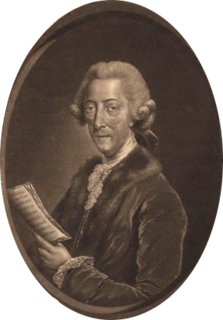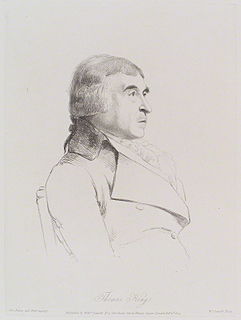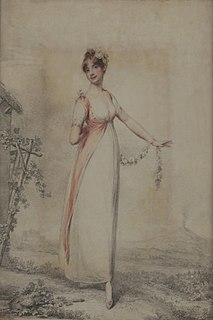
Thomas Augustine Arne was an English composer. He is best known for his patriotic song "Rule, Britannia!" and the song "A-Hunting We Will Go". Arne was a leading British theatre composer of the 18th century, working at Drury Lane and Covent Garden. He wrote many operatic entertainments for the London theatres and pleasure gardens, as well as concertos, sinfonias, and sonatas.

Richard Brinsley Butler Sheridan was an Irish satirist, a politician, a playwright, poet, and long-term owner of the London Theatre Royal, Drury Lane. He is known for his plays such as The Rivals, The School for Scandal, The Duenna and A Trip to Scarborough. He was also a Whig MP for 32 years in the British House of Commons for Stafford (1780–1806), Westminster (1806–1807), and Ilchester (1807–1812). He is buried at Poets' Corner in Westminster Abbey. His plays remain a central part of the canon and are regularly performed worldwide.

David Garrick was an English actor, playwright, theatre manager and producer who influenced nearly all aspects of theatrical practice throughout the 18th century, and was a pupil and friend of Dr Samuel Johnson. He appeared in a number of amateur theatricals, and with his appearance in the title role of Shakespeare's Richard III, audiences and managers began to take notice.

Charles Dibdin was an English composer, musician, dramatist, novelist and actor. With over 600 songs to his name, for many of which he wrote both the lyrics and the music and performed them himself, he was in his time the most prolific English singer-songwriter. He is best known as the composer of "Tom Bowling", one of his many sea songs, which often features at the Last Night of the Proms. He also wrote about 30 dramatic pieces, including the operas The Waterman (1774) and The Quaker (1775), and several novels, memoirs and histories.
Hugh Kelly was an Irish dramatist and poet. From the 1760s he was employed as a propagandist for the British government, attacking members of the Opposition. After arriving in London in 1760 to work as a staymaker, he soon turned to become a writer and made a living as a journalist. In 1766 he published Thespis, a long poem about the acting profession, which gained him wide attention. He followed up this success with the novel Memoirs of a Magdalen in 1767. He ultimately became known for his stage plays such as False Delicacy and A Word to the Wise.

The Theatre Royal, Drury Lane, commonly known as Drury Lane, is a West End theatre and Grade I listed building in Covent Garden, London, England. The building faces Catherine Street and backs onto Drury Lane. The building is the most recent in a line of four theatres which were built at the same location, the earliest of which dated back to 1663, making it the oldest theatre site in London still in use. According to the author Peter Thomson, for its first two centuries, Drury Lane could "reasonably have claimed to be London's leading theatre". For most of that time, it was one of a handful of patent theatres, granted monopoly rights to the production of "legitimate" drama in London.

Elizabeth Farren was an Irish actress of the late 18th century. Born in Cork in 1759 her father, George Farren was a surgeon. His drinking habits brought on early death and his widow returned to Liverpool. Her mother went on the stage to support herself and her children. Elizabeth first appeared on the London stage in 1777 as Miss Hardcastle in She Stoops to Conquer and the following year appeared at Drury Lane which, along with the Haymarket Theatre became her primary venues for the rest of her acting career. She had over 100 characters in her repertoire including Shakespeare and various contemporary comedies and dramas. She was often compared to Frances Abington, who was her only real rival. Her last appearance was in April 1797, two months before her marriage to Edward Smith-Stanley, 12th Earl of Derby. They had a son and two daughters.

Richard III (1699) is a history play written by Colley Cibber. It is based on William Shakespeare's Richard III, but reworked for Williamite audiences.

Richard Tickell (1751–1793) was an English playwright and satirist.

Elizabeth Younge was an English actress who specialized in Shakespearean roles.

John Bannister, , English actor and theatre manager. The principal source for his life are his own Memoirs, and as a leading performer his career is well documented.
The Battle of Hastings is a 1778 play by the English writer Richard Cumberland. It is a tragedy set around the Battle of Hastings in 1066. It was staged at the Drury Lane Theatre in October 1778 by Richard Brinsley Sheridan. Sheridan later mocked Cumberland's sensitivity to criticism by modelling the character Sir Fretful Plagiary, in his 1779 play The Critic, after him.
The Note of Hand, or Trip to Newmarket is a 1774 comedy play by the British writer Richard Cumberland. A farce it was the final play performed by David Garrick at the Drury Lane Theatre before his retirement. The play mocked some of the leading Whig politicians of the era such as Charles Fox and the Duke of Devonshire. This may have been the cause of Cumberland's dispute with Richard Brinsley Sheridan who was a Whig. Sheridan went on to create a character closely based on Cumberland in the 1779 play The Critic.

Samuel Jackson Pratt was a prolific English poet, dramatist and novelist, writing under the pseudonym of "Courtney Melmoth" as well as under his own name. He authored around 40 publications between 1770 and 1810, some of which are still published today, and is probably best remembered as the author of Emma Corbett: or the Miseries of Civil War, (1780) and the poem Sympathy (1788). Although his reputation was tainted by scandal during his lifetime, he is today recognised as an early campaigner for animal welfare and the first English writer to treat the American Revolution as a legitimate subject for literature.

Thomas King (1730–1805) was an English actor, known also as a theatre manager and dramatist.

John Moody (1727?–1812), original name John Cochran, was an Irish actor.
Frederick Pilon (1750–1788) was an Irish actor and dramatist.
James Lacy (1696-1774) was a British stage actor and theatre manager.
Richard Hurst was a British stage actor.

Arabella Menage, also known as Mrs. Sharp, was a British actress and dancer of the late 18th and early 19th centuries. She was the wife of the artist Michael William Sharp.















